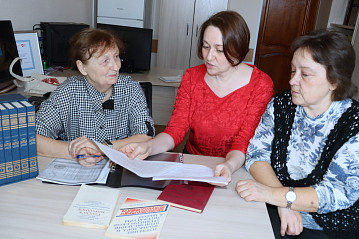Philologists from Altai State University are forming a unique database of Altai folklore
 Within the framework of the project group “Epic and Culture of the Greater Altai” within the Research Center for Altaic and Turkic Studies “The Greater Altai” of Altai State University, a study was conducted of folklore material gathered by students and teachers of the University during expeditions throughout Altai Krai in the mid-1980s, dating back to the Soviet era.
Within the framework of the project group “Epic and Culture of the Greater Altai” within the Research Center for Altaic and Turkic Studies “The Greater Altai” of Altai State University, a study was conducted of folklore material gathered by students and teachers of the University during expeditions throughout Altai Krai in the mid-1980s, dating back to the Soviet era.
Philologists from the Institute of Humanities at Altai State University have begun digitizing extensive folklore collection. During the research, a database was created titled “The Presence of the “bylichki” Genre in Altai Krai”, officially registered in the Federal Service for Intellectual Property. This marks the first outcome of large-scale work to digitize a substantial volume of accumulated information collected during field expeditions spanning several decades, which the department is committed to continue.
Led by Tatyana Chernyshova, Professor, Head of the Department, Doctor of Philology, a team of experts including Yulia Trubnikova, Professor, Doctor of Philology, and Ekaterina Romanova, an associate professor, Candidate of Philological Sciences, collaborated on the development of the database.
The database serves the purpose of storing, systematizing and searching for information about specific examples of the presence of the “bylichki” genre in Altai Krai, discovered as a result of collecting folklore material. This folklore genre has been known for a long time, has its own characteristics and, in general, revolves around narrative involving encounters with the supernatural. Throughout the project, the tales were classified thematically into 9 sections: about the deceased, supernatural entities, retribution, societal norms (regulating human behavior), daily life, sorcerers and witches, animals, household spirits, and walking. In addition, the database includes information about informants who provided the information and the collectors who gathered it.
“The territory of our region provides rich folklore heritage, shaped by a blend of different traditions brought by early settlers. Notably, the folklore material gathered during past expeditions includes copies of oral folk art, recorded by collectors from the words of illiterate elderly people, which they heard from their grandmothers and mothers and kept in memory. Considering that the expeditions took place almost four decades ago, we are dealing with unique works of Altai folklore,” emphasized Ekaterina Romanova, an associate professor of the Department of General and Applied Philology, Literature and Russian Language at Altai State University, Candidate of Philological Sciences.
The database of “bylichki”, formed by philologists of the Institute of Social Sciences of Altai State University, is aimed at specialists in the field of folklore, as well as at people interested in folklore and its study.